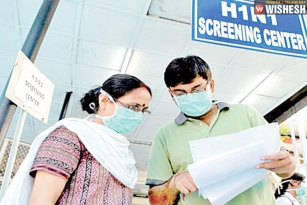

Although the name 'swine flu' brings up a lot of extra fear and worry, it is important to note that swine flu is just an influenza A H1N1 virus. The big difference is that the current swine influenza A (H1N1) virus has components of pig and bird influenza viruses in it, so that humans don't have any immunity to it. That is what made it more likely that it would become a pandemic virus (have the ability to cause a global outbreak) because it could easily spread from person-to-person.
The Swine flu has been compared to other similar types of influenza virus in terms of mortality: "in the US it appears that for every 1000 people who get infected, about 40 people need admission to hospital and about one person dies".
How Swine Flu Works
Symptoms of swine flu infections can include :

Swine Flu Symptoms
* fever, which is usually high, but unlike seasonal flu, is sometimes absent
* cough
* runny nose or stuffy nose
* sore throat
* body aches
* headache
* chills
* fatigue or tiredness, which can be extreme
* diarrhea and vomiting, sometimes, but more commonly seen than with seasonal flu
Signs of a more serious swine flu infection might include pneumonia and respiratory failure.
Swine Flu High Risk Groups -
Swine flu high risk groups, people who are thought to be at risk for serious, life-threatening infections, are a little different and can include:
* pregnant women
* people with chronic medical problems, such as chronic lung disease, like asthma, cardiovascular disease, diabetes, and immunosuppression
* children and adults with obesity
Precautions to keep swine flu at bay
The deadly Swine Flu has reached the Indian shores following the global outbreak and now, claimed one life. However, Swine Flu is certainly one of those diseased where an ounce of prevention is worth a pound of cure. Here are five tips for you to keep away from the pandemic.
Swine Flu Precautions
1. Wash your hands frequently
Use the antibacterial soaps to cleanse your hands. Wash them often, for at least 15 seconds and rinse with running water.
2. Get enough sleep
Try to get 8 hours of good sleep every night to keep your immune system in top flu-fighting shape.
3. Drink sufficient water
Drink 8 to10 glasses of water each day to flush toxins from your system and maintain good moisture and mucous production in your sinuses.
4. Boost your immune system
Keeping your body strong, nourished, and ready to fight infection is important in flu prevention. So stick with whole grains, colorful vegetables, and vitamin-rich fruits.
5. Keep informed
The government is taking necessary steps to prevent the pandemic and periodically release guidelines to keep the pandemic away. Please make sure to keep up to date on the information and act in a calm manner.
Treatment -
If a person becomes sick with swine flu, antiviral drugs can make the illness milder and make the patient feel better quicker. For treatment, antiviral drugs work best if started soon after getting sick (within 2 days of symptoms). The U.S. CDC recommends the use of Tamiflu (oseltamivir) or Relenza (zanamivir) for the treatment and/or prevention of infection with swine influenza viruses; however, the majority of people infected with the virus make a full recovery without requiring medical attention or antiviral drugs.
Vaccination -
WHO does not expect the swine flu vaccine to be widely available until the end of 2009, noting that current production "yield" was only about half as much as expected and would cause timeline delays. There is also concern that countries which produce vaccines, 70 percent of which are in Europe, may delay sending swine flu vaccines to other countries as they may come under "tremendous pressure to protect their own citizens first," note some experts.
Many countries are planning full blown large scale vaccination camps by the end of the year.














